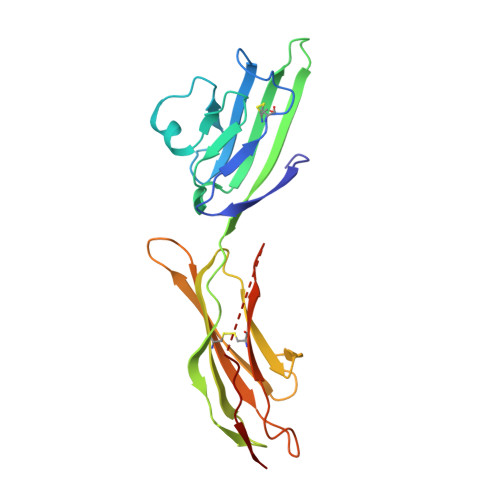A fragment-based approach to discovery of Receptor for Advanced Glycation End products inhibitors.
Kozlyuk, N., Gilston, B.A., Salay, L.E., Gogliotti, R.D., Christov, P.P., Kim, K., Ovee, M., Waterson, A.G., Chazin, W.J.(2021) Proteins 89: 1399-1412
- PubMed: 34156100
- DOI: https://doi.org/10.1002/prot.26162
- Primary Citation of Related Structures:
6XQ1, 6XQ3, 6XQ5, 6XQ6, 6XQ7, 6XQ8, 6XQ9, 7LML, 7LMW - PubMed Abstract:
The Receptor for Advanced Glycation End products (RAGE) is a pattern recognition receptor that signals for inflammation via the NF-κB pathway. RAGE has been pursued as a potential target to suppress symptoms of diabetes and is of interest in a number of other diseases associated with chronic inflammation, such as inflammatory bowel disease and bronchopulmonary dysplasia. Screening and optimization have previously produced small molecules that inhibit the activity of RAGE in cell-based assays, but efforts to develop a therapeutically viable direct-binding RAGE inhibitor have yet to be successful. Here, we show that a fragment-based approach can be applied to discover fundamentally new types of RAGE inhibitors that specifically target the ligand-binding surface. A series of systematic assays of structural stability, solubility, and crystallization were performed to select constructs of the RAGE ligand-binding domain and optimize conditions for NMR-based screening and co-crystallization of RAGE with hit fragments. An NMR-based screen of a highly curated ~14 000-member fragment library produced 21 fragment leads. Of these, three were selected for elaboration based on structure-activity relationships generated through cycles of structural analysis by X-ray crystallography, structure-guided design principles, and synthetic chemistry. These results, combined with crystal structures of the first linked fragment compounds, demonstrate the applicability of the fragment-based approach to the discovery of RAGE inhibitors.
Organizational Affiliation:
Department of Biochemistry, Center for Structural Biology, Vanderbilt University, Nashville, Tennessee, USA.





















